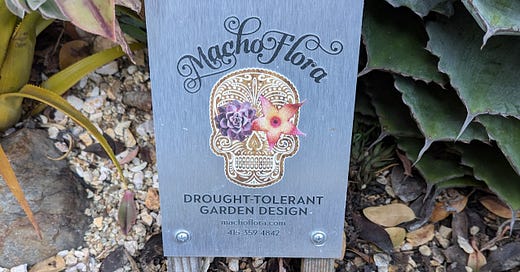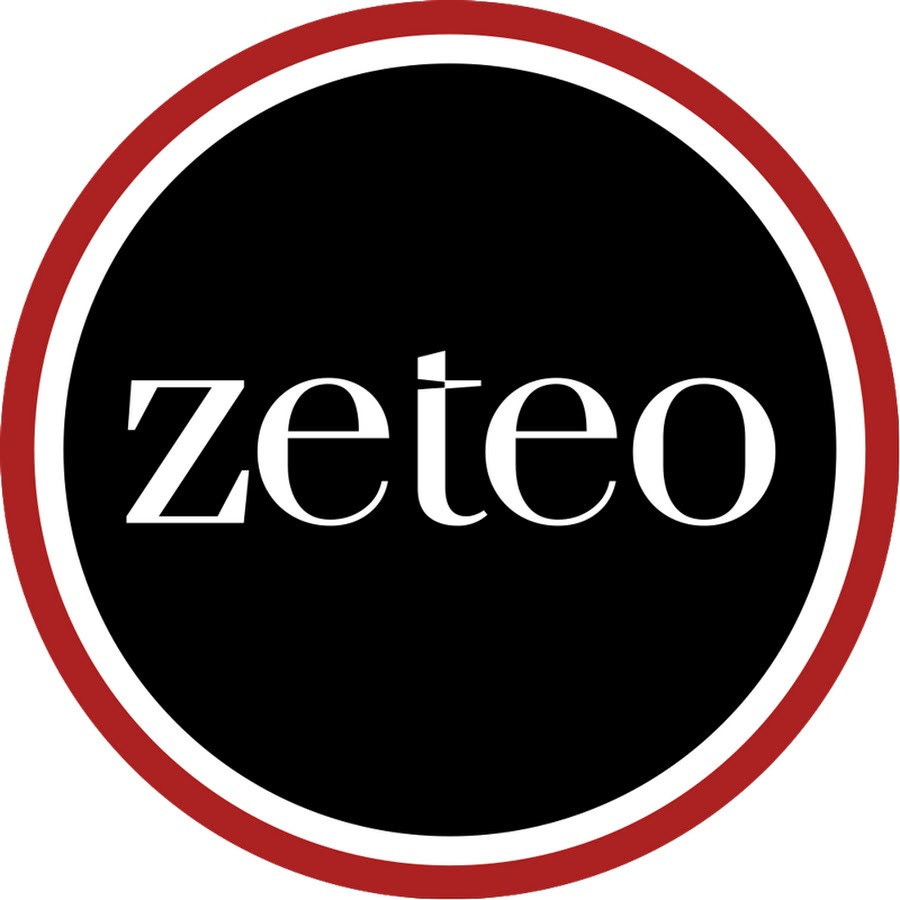Tomorrow, August 9, is my one-year anniversary on Substack (my Subversary?). Thanks to everyone who has subscribed over the last 12 months — more than 1,200 subscribers now! — and especially to all who have left comments, restacked posts, and otherwise joined the confab/conflab1. This newsletter remains free to all, but if you’d like to chip in a few bucks to keep the lights on, you can buy me a coffee or three (or more). Thank you!
Let’s take a break from the political chat of the last couple of weeks and look at some brand names!
Two of the names are derived from non-English words; one is a portmanteau. This report is the ninth in a series; see the intro to Naming Briefs #8 for more info about the series and links to previous Naming Briefs.
Macho Flora.
I literally spotted Macho Flora in the wild, on a sign posted in a glorious cactus/succulent garden not far from where I live.
I love everything about this: the botanical tendrils on the cursive wordmark, the two nicely balanced five-letter words, the masculine/feminine juxtaposition, the Spanish/Latin juxtaposition, the gorgeous skull logo inspired by Day of the Dead calaveras.
The business has a legitimate claim to the name: Its owner is Mark Ramirez, a macho-looking garden designer with a Spanish surname. ¡Bravo!
Zeteo.
In January 2024, after MSNBC canceled his news show, British-American journalist
announced that he would be leaving the network. In February he launched the digital news company with a team of left-leaning contributors that includes Greta Thunberg, Naomi Klein, and Cynthia Nixon. Zeteo, Hasan wrote, would be “a new media organization that seeks to answer the questions that really matter, while always striving for the truth.” At this writing Zeteo has more than 220,000 subscribers at levels from free to $500 a year.As for the name, it “comes from the ancient Greek word for ‘seeking out’ and ‘striving’” and “goes back to Socrates and Plato.” He doesn’t mention that it also goes back to the original language of the Christian Bible, where it appears more than 100 times. (E.g., Matthew 6:33: “But seek first the kingdom of God and His righteousness.”)
How to pronounce it? In an introductory video, Hasan says “zit-AY-oh,” rhyming the word, roughly, with Rodeo as in Rodeo Drive, with the stress on the second syllable. The actual Greek pronunciation is closer to “zay-TAY-oh.”
The religious/philosophical pedigree of zeteo makes it a rather cerebral choice for a news-media organization.2 So although it’s a “real word” with “real meaning,” it functions here mostly as an “empty-vessel” name like “Kodak,” with the extra zing of that Z at the front.
Hasan’s Zeteo isn’t the only Zeteo on the block. There’s a Zeteo Group in Orlando, Florida, that does tax preparation and claims to “specialize in solving problems.” There’s a Christian-oriented Zeteo Community in Madison, Wisconsin, that serves “women who have been sexually exploited.” ZeteoTech, in Sykesville, Maryland, says it’s “enabling next-generation biodefense solutions.” Zeteo Health, in New York, “is an AI-powered platform that accelerates access to preventative healthcare, increases patient engagement, and empowers members to take control of their health by providing culturally tailored health information and connections to care.” Zeteo Therapy and Wellness provides mental-health services in Indiana. There are also dead trademarks for Zeteo Toys and Zeteo Capital. The existence of multiple Zeteos isn’t necessarily a problem as long as they occupy distinct trademark classes and are unlikely to cause confusion.
As a name, “Zeteo” straddles “mysterious” and “nerdy” on the brand-personality spectrum, which may suit Oxford-educated Hasan just fine. Whether it can connect with a broader audience — millions as opposed to thousands — remains to be seen, or sought.
Stratechery.
I’d been sitting with this name for months, unable to see it as anything but STRAT-a-cherry. Which means . . . what?
I showed the Stratechery logo to a couple of well-informed friends who were likewise puzzled. The image — OK, a fountain-pen nib that’s also some sort of circuit board? But neither friend could figure out how to pronounce “Stratechery,” and both were reminded of “strategery,” the madeupical word used by Will Farrell, portraying presidential candidate George W. Bush, in a 2000 episode of “Saturday Night Live.”
Then I got around to listening to a 2022 episode of the Acquired podcast (my new favorite!) in which hosts Ben Gilbert and David Rosenthal interviewed Stratechery founder Ben Thompson, and the pronunciation problem got cleared up right away: It’s strah-TEK-ury. From strategy and technology. According to the hosts, Stratechery is “the internet’s best strategy analysis destination” and has “inspired a whole generation of business content creators” — including, it seems, Substack.
All that despite having a #shitmanteau3 name worthy of inclusion in the Naming Hall of Shame. (Other shitmanteau shame-ees include Analtech, Comirnaty, Tronc, Rapiscan, and Pharmaciopy.)
I probably don’t need to tell you, or Ben Thompson, why Stratechery is bad, but I going to do it anyway. A non-inclusive list:
The stress pattern is unclear and confusing
Strate- does not evoke “strategy” (I associated it with substrate)
Even if you manage to tease “strategy” and “tech” out of the name, you’re likely to think that this is a business that provides strategy advice to technology companies — which it doesn’t
What’s that -ery suffix doing there?
Guess what: Ben Thompson knows it’s a shitty name! About 40 minutes into the podcast, he admits that “it’s a bad name for a word-of-mouth site to be a name that no one knows how to pronounce. . . . People are afraid to say it because they’re worried they’ll say it wrong. If they say it, they don’t know how to spell it, so it’s not perfect by any means.”
These are giant red flags! Which he ignored.
And then he says the thing that always makes me, a professional name developer, bang my head on my desk multiple times. He says none of the bad stuff matters because:
More importantly, the URL existed, the Twitter handle existed. It didn’t exist in Google search.
Repeat after me: These are not the “most important” things. They are not even medium-important things. You can finesse a URL and a social-media handle: Acquired.com was taken, so the podcast is Acquired.fm, with a more relevant domain extension. The most important things about a brand name are memorability and distinctiveness. (Remember: A name is the title of your story.) Legal availability — a very different thing from domain availability — is also “most important.”
Sure, there are some good portmanteau words and names: brunch, smog, Travelocity. But defaulting to a portmanteau for your brand name usually tells me that you’re hung up on description, which is a fatal flaw in naming, and that you have only one name-creation trick up your sleeve.4 Don’t mash words and word parts together to tell me what you do; tell me instead why I should care. Or as Chekhov put it: “Don’t tell me the moon is shining; show me the glint of light on broken glass.”
Thompson also says that the name that he’s “always been most jealous of” is Asymco, which made me resume the head-pounding. Here we have another portmanteau name for a business-analysis company — it was coined from “asymmetric competition” and tells you so right up front, and again, who cares — that while not as overtly shitty as Stratechery is just as descriptive, bland, and uninviting.
Can Stratechery redeem itself? I have my doubts. It could emphasize the TECH element in the wordmark in some way (larger typeface, different color). That might help a little with pronunciation. But the name would still be a #shitmanteau.
I’ll leave you with a little verse I wrote many years ago, during another fit of despondency over #shitmanteaus:
Beware the awkward portmanteau!
The syllables that clash and grate!
Avoid the sound inapropos
And the sense third-rate.
Full credit to Lewis Carroll and “Jabberwocky,” of course.
Thanks, Lynne Murphy!
And no, zeteo isn’t related to gazette, which comes from Italian gazeta, a small copper coin that was the cost of a newspaper published in 17th-century Venice.
Full credit to trademark lawyer Jessica Stone Levy for that coinage.
Hey, at least he didn’t name the business Techy McTechface.








First thing I thought of with name + image was scratching, as you do with a pen.
My take on Stratechery was "tech leaders being lecherous."